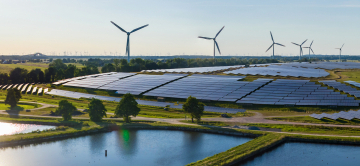Green consumerism is changing the effectiveness and relevance of environmental policies. Here’s why.
It is difficult to escape the frenzy of consumption in the run-up to Christmas. If we can't consume less, we can try to consume better by choosing less polluting products. Reducing packaging, buying organic food, driving an electric car, signing a 100% renewable electricity contract, there are plenty of opportunities. Of course, it will cost you a little more, but isn't that the price to pay to save the planet? Companies are responding to this expectation by focusing their promotional campaign on the benefits of their actions on the environment. They compete in initiatives to plant trees, install solar panels, reduce waste, water consumption, the use of polluting chemicals, etc. And they make it known on their ads with beautiful images of nature.
An inefficient outcome
In a recently published article, we analyze the consequences of this craze for eco-consumption on environmental policies and, ultimately, on environmental protection. First lesson: the presence of eco-consumers can be economically inefficient. The demand of eco-consumers creates a supply of products differentiated by their environmental quality, so that pollution control efforts are not allocated optimally. We end up with products that avoid pollution at a higher cost than others. For example, foodstuffs labelled as organic reduce water pollution (pesticides and nitrogen) at much higher costs than if the standards of conventional agriculture were raised. We could then achieve the same improvement in the quality of our waterways at a lower cost for the agricultural sector.
Second lesson: eco-consumption reverses the superiority of taxes over standards as an environmental policy instrument. A carbon tax amplifies the difference in costs of reducing CO2 emissions between products, which worsens the inefficiency of allocating pollution control efforts. The same level of environmental protection could be achieved at a lower cost with a technological standard of energy efficiency, or of the share of renewables in the energy mix.
Laxer environmental policies
Another perverse effect of eco-consumption is to encourage the adoption of less stringent environmental policies. Society may favor a status-quo with pollution abatement efforts driven by green consumerism rather than reinforcing environmental standards. Whereas, in the absence of green consumerism, people would have pushed for stricter environmental policies, they do not to get cheaper products. As consumers, they can buy products of poor environmental quality at a low price or contribute to environmental protection at a higher but still affordable price. As citizens, they are satisfied with this milder level of environmental protection. The planet would have been better off if the contributions to the environment were better distributed among consumers.
*
* *
The active consumers in each of us wonder how we could save the planet from the predicted ecological disasters. Our consumption choices can contribute to this. But our behavior as green consumers cannot replace our duties as citizens. Voting with our wallet is not enough, we must also ensure that stringent environmental policies are imposed on producers.





